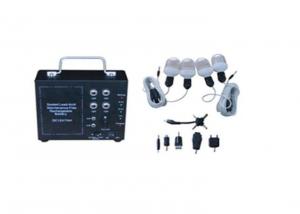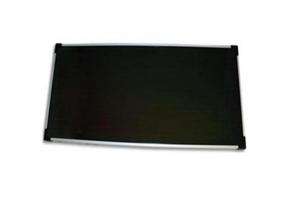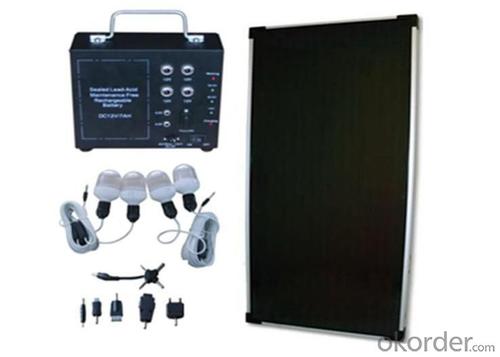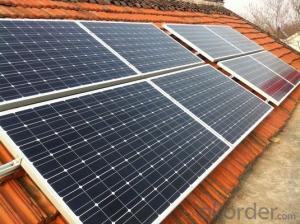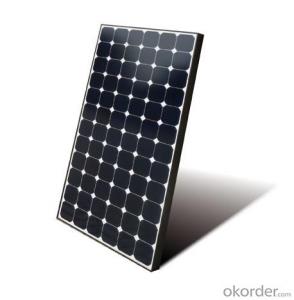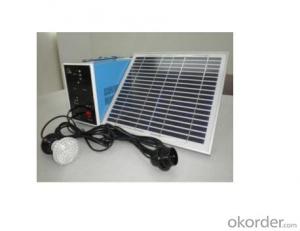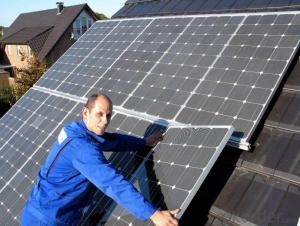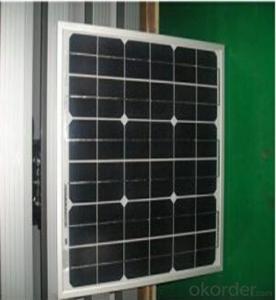Solar Energy Systems Au - CNBM-TS2 (15W)
- Loading Port:
- China Main Port
- Payment Terms:
- TT or L/C
- Min Order Qty:
- 1 set set
- Supply Capability:
- 1000 sets per month set/month
OKorder Service Pledge
OKorder Financial Service
You Might Also Like
Brief Introduction of Solar Energy System CNBM-TS2 (15W)
CNBM Solar is specialized in PV power systems 15W ourput.
Our company not only can supply high quality solar Products, but also provides professional system Solutions and high quality services.
large blocks of molten silicon carefully cooled and solidified. PolySi cells are less expensive to produce than single crystal silicon cells,
but are less efficient.
US DOE data shows that there were a higher number of multicrystalline sales than monocrystalline silicon sales.
The Sketching of Solar Energy System CNBM-TS2 (15W)
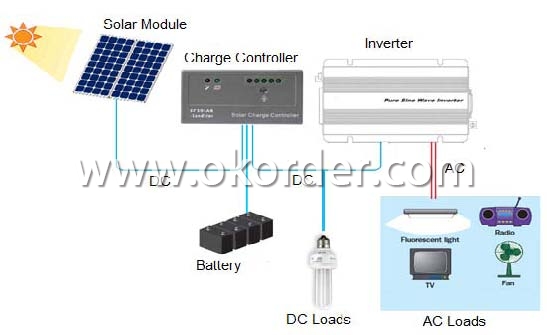
Components of Solar Energy System CNBM-TS2 (15W)
PV Array:
Convert sunlight instantly into DC electric power. Formed by the solar modules (also called photovoltaic modules) in accordance with the system requirements for series and parallel.
Solar Charge Controller:
A charge controller may be used to power DC equipment with solar panels. The charge controller provides a regulated DC output and stores excess energy in a battery as well as monitoring the battery voltage to prevent over charge or over discharge. An inverter can be connected to the output of a charge controller to drive AC loads.
Inverter:
Converts DC output power of photovaltaic soalr panels into standard AC power for use in the local off-grid electrical network. It is a critical component in a photovoltaic system, allowing the use of ordinary commercial appliances.
Battery banks:
Stores energy when there is an excess coming in and distribute it back out when there is a demand. Solar PV panels continue to re-charge batteries each day to maintain battery charge.
Technical data of Solar Home System CNBM-TS2 (15W) | ||||
Solar panel | Pmax | 15W | ||
Vmp | 17.5V | |||
Imp | 0.857A | |||
Battery | Capacity | 12V/7AH | ||
Accessories | 5W Amorphous Solar panel*1 Power box *1 LED bulb with 10m wire*4 Mobile phone adapter*1 Mounting pad*1 | |||
Package Data of Solar Home system CNBM-TS2 (15W) | ||||
Carton Size (L*W*H mm) | Carton Weight(kg) | PCS/CTN | 20’(PCS) | 40’(PCS) |
1215*185*375 | 19.8 | 2 | 600 | 1300 |
Factory Picture of Solar Energy System CNBM-TS2 (15W)
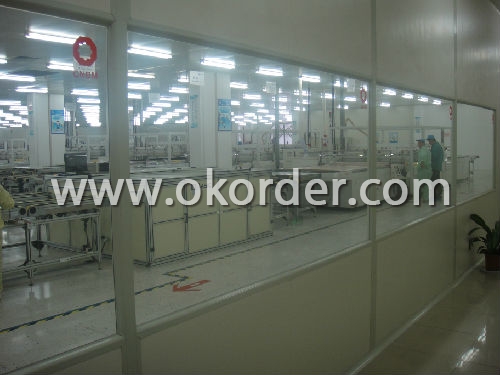
Package Picture2 of Solar Energy System CNBM-TS2 (15W)
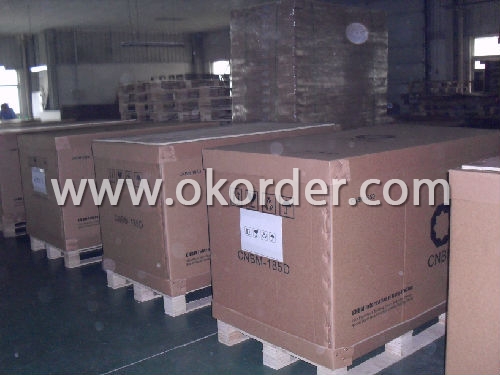
- Q: Are there any limitations to the lifespan of solar energy systems?
- Solar energy systems do have limitations to their lifespan, with the degradation of solar panels being the most significant. Over time, the photovoltaic cells in the panels gradually degrade, resulting in a decrease in efficiency. On average, solar panels experience an annual degradation rate of about 0.5-1%. This means that after 25-30 years, the panels may only produce around 75-80% of their original power output. Another limitation arises from the lifespan of other components in the solar energy system, including inverters, batteries (if applicable), and wiring. Inverters, responsible for converting the DC electricity generated by the solar panels into AC electricity for household or business use, typically last for 10-15 years. Batteries, if used for energy storage, have a limited lifespan of approximately 5-10 years. Wiring can also deteriorate over time due to exposure to the elements, necessitating maintenance or replacement. Moreover, the lifespan of solar energy systems can be impacted by environmental factors. Extreme weather conditions like hailstorms, hurricanes, or heavy snowfall can cause damage to solar panels, reducing their efficiency or rendering them inoperable. Additionally, excessive heat can accelerate the degradation of solar panels, leading to a shorter lifespan. Nevertheless, it is essential to highlight that proper maintenance and regular inspections can help maximize the lifespan and performance of solar energy systems. Many solar panels come with warranties that ensure their performance for a specific number of years, often ranging from 20 to 25 years. Furthermore, ongoing technological advancements and improvements in manufacturing processes may result in longer-lasting and more efficient solar energy systems in the future.
- Q: Do solar energy systems require grounding?
- Grounding is crucial for solar energy systems, as well as any other electrical system, for safety reasons. It serves as a protection against electrical faults, lightning strikes, and other potential dangers. In a solar energy system, grounding is typically accomplished by connecting all metal components, such as solar panels, inverters, and racking systems, to a common ground. This is done by using grounding wires or cables that are linked to a grounding electrode, like a grounding rod or a metal water pipe. Grounding plays various important roles in solar energy systems. Firstly, it safeguards against electrical shock hazards by providing a safe pathway for electrical currents in case of a fault or malfunction. Additionally, grounding helps prevent damage to the system by diverting lightning strikes or other electrical surges away from sensitive components. Moreover, grounding is mandatory according to electrical codes and regulations. These codes ensure the safe installation and operation of solar energy systems, adhering to industry standards. Failure to comply with grounding requirements can lead to safety risks, equipment harm, or even legal consequences. In conclusion, grounding is an essential and significant aspect of solar energy systems. It guarantees the system's and its operators' safety, shields against electrical faults and lightning strikes, and ensures adherence to electrical codes and regulations.
- Q: Can solar energy systems be used in powering warehouses or distribution centers?
- Yes, solar energy systems can be used to power warehouses or distribution centers. Solar panels can be installed on the roofs of these buildings to convert sunlight into electricity, which can then be used to meet their energy needs. This can help reduce reliance on traditional energy sources and lower operating costs while also promoting sustainability.
- Q: Can solar energy systems be used for powering off-grid recreational vehicles?
- Yes, solar energy systems can be used to power off-grid recreational vehicles. Solar panels can be installed on the roof of the vehicle to capture sunlight and convert it into electricity. This renewable energy source can charge the RV's batteries, providing power for various appliances and systems while being independent of traditional power sources.
- Q: Can solar energy systems be used in powering research farms or agricultural laboratories?
- Yes, solar energy systems can certainly be used to power research farms or agricultural laboratories. Solar energy is a clean and renewable source of power that can be harnessed through the installation of solar panels. These panels convert sunlight into electricity, which can then be used to power various equipment and facilities. Research farms and agricultural laboratories often require a significant amount of electricity to operate, including lighting, heating, cooling, and powering agricultural machinery. By utilizing solar energy systems, these facilities can reduce their reliance on fossil fuels and decrease their carbon footprint. Solar energy systems can be installed on the roofs of buildings or on open land near the research farm or laboratory. The amount of solar energy generated will depend on factors such as the location of the facility, the size of the solar panels, and the amount of sunlight received. However, with advancements in solar technology, even areas with limited sunlight can still benefit from solar energy systems. In addition to being environmentally friendly, solar energy systems can also provide long-term cost savings for research farms and agricultural laboratories. Once installed, solar panels have a lifespan of 25-30 years, requiring minimal maintenance. This can lead to significant savings on electricity bills, especially in rural areas where grid connectivity may be unreliable or expensive. Furthermore, solar energy systems can provide a reliable source of power, especially during periods of peak demand or power outages. By incorporating battery storage systems, excess energy generated during the day can be stored and used during the night or cloudy days, ensuring a continuous power supply for research activities. Overall, solar energy systems are a viable and sustainable solution for powering research farms and agricultural laboratories. They offer numerous benefits, including reduced environmental impact, long-term cost savings, and reliable power supply. As the demand for renewable energy continues to grow, integrating solar energy systems into agricultural facilities can contribute to a greener and more sustainable future.
- Q: How does the performance of solar panels degrade over time?
- The performance of solar panels degrades over time due to various factors such as exposure to sunlight, temperature fluctuations, and environmental conditions. These factors can cause the panels to degrade gradually, resulting in a decrease in their efficiency and power output. Additionally, the accumulation of dirt, dust, and debris can also impact the performance of solar panels over time. Regular maintenance and cleaning can help mitigate this degradation and ensure optimal performance.
- Q: Are there any tax benefits for installing a solar energy system?
- Installing a solar energy system comes with numerous tax benefits. One significant benefit is the federal investment tax credit (ITC), which permits individuals and businesses to deduct a percentage of their solar energy system's cost from their federal taxes. As of 2021, the ITC offers a 26% tax credit for residential and commercial systems. Moreover, some states provide their own tax incentives for solar energy installations. These incentives may encompass exemptions from property taxes, sales taxes, or state tax credits. The availability and extent of these incentives differ from state to state, necessitating thorough research into the specific incentives offered in your region. Furthermore, the installation of a solar energy system can enhance your property's value. Numerous studies have demonstrated that homes equipped with solar panels yield a higher selling price compared to those without. This boost in property value can yield long-term financial advantages. To fully comprehend and capitalize on all the tax benefits associated with installing a solar energy system, it is advisable to consult a tax professional or a solar energy expert.
- Q: Do solar energy systems require maintenance?
- Yes, solar energy systems do require maintenance. Regular maintenance, such as cleaning the panels, checking for any damage or malfunctions, and ensuring proper functioning of the system, is necessary to maintain the efficiency and longevity of the solar energy system. Additionally, periodic inspections by professionals can help identify and address any potential issues before they become major problems.
- Q: Can a solar energy system be installed on a hotel or resort?
- Certainly, hotels and resorts have the ability to install a solar energy system. In fact, establishments all over the world have already adopted solar energy and have incorporated solar panels on their roofs or in the nearby areas. Solar energy systems offer various benefits to hotels and resorts, including cost savings, decreased environmental impact, and improved sustainability practices. By harnessing the power of the sun, hotels and resorts can generate clean and renewable electricity to fulfill a significant portion of their energy requirements. This can result in substantial savings on electricity bills, particularly in regions with abundant solar energy potential. Furthermore, solar energy systems can help reduce dependence on traditional energy sources like fossil fuels, thus mitigating the risks associated with fluctuating energy costs. The installation of solar panels on hotel and resort roofs or in open spaces is also an effective way to promote environmental sustainability. Solar energy is a clean and renewable power source that produces no greenhouse gas emissions or air pollutants during operation. By transitioning to solar energy, hotels and resorts can significantly decrease their carbon footprint and contribute to global efforts in combating climate change and promoting a greener future. Moreover, embracing solar energy can boost reputation and attract environmentally conscious guests. Many travelers actively seek out eco-friendly accommodations that prioritize sustainability practices. By installing a solar energy system, hotels and resorts can demonstrate their commitment to environmental stewardship and appeal to a growing market of eco-conscious tourists. In conclusion, hotels and resorts can undoubtedly install solar energy systems, which offer several advantages including cost savings, reduced environmental impact, and increased appeal to eco-conscious travelers. As the world continues to prioritize renewable energy sources, hotels and resorts can play a crucial role in the transition to a sustainable future by embracing solar energy.
- Q: What is the role of solar concentrators in solar energy systems?
- Solar concentrators play a crucial role in enhancing the efficiency of solar energy systems by concentrating sunlight onto a smaller area, thereby increasing the intensity of the light. This concentrated sunlight can then be converted into electricity or used for heating purposes, maximizing the energy output from the solar panels or thermal collectors.
Send your message to us
Solar Energy Systems Au - CNBM-TS2 (15W)
- Loading Port:
- China Main Port
- Payment Terms:
- TT or L/C
- Min Order Qty:
- 1 set set
- Supply Capability:
- 1000 sets per month set/month
OKorder Service Pledge
OKorder Financial Service
Similar products
Hot products
Hot Searches
Related keywords

